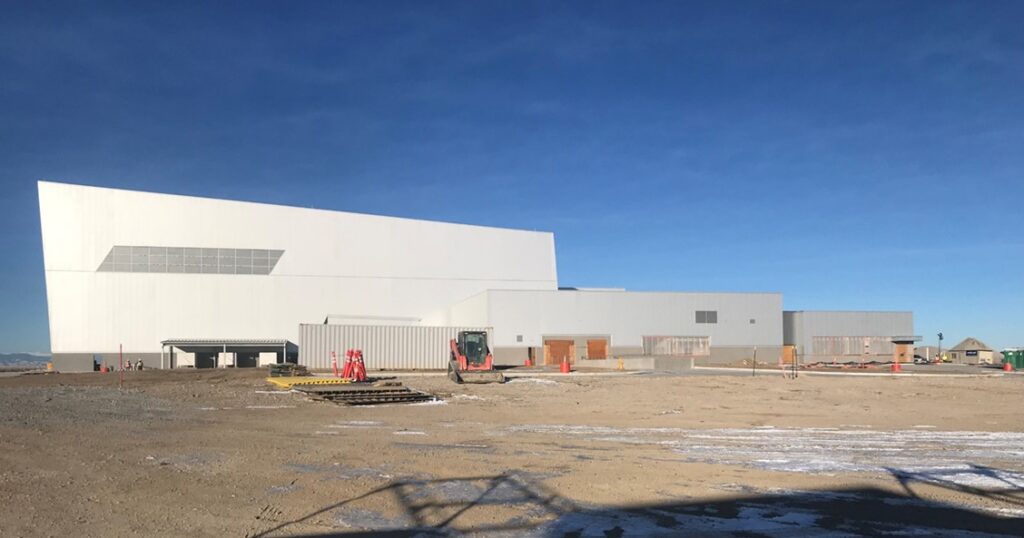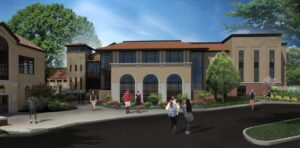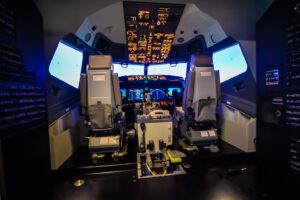DEN Southwest Maintenance Hangar received the 2022 AGC Colorado ACE Award for Best Building Project –
Specialty Contractor ($6-$10 Million)
With one of the largest aircraft fleets in the world and Denver International Airport (DEN) being its largest hub, the importance of Southwest Airlines building its new 130,000-square-foot Maintenance Hangar was a critical component of the continual growth of the airline. This new hangar enables aircraft maintenance to expand and continue year-round allowing additional and more reliable airplanes to operate. Up until this project, Southwest Airlines relied on performing unexpected maintenance in neighboring competitors’ DEN hangars.
Murphy Company was proud to partner with Swinerton to construct this new hangar on a 26-acre site that includes space for three Boeing 737 planes inside and space to park another eight planes outside. The building also included offices, a training area, warehouse space, and a maintenance shop. Murphy Company’s expertise in hangar construction, ability to develop innovative solutions quickly, collaboration techniques, and unparalleled safety culture were critical to the successful completion of this project.
Early in the construction of this new, highly anticipated hangar, was the onset of the COVID-19 pandemic, the effects of which ended up extending the project by a year. During this time, travel restrictions and stay-at-home orders were enacted limiting air travel. With the drastic reduction in air travel, Southwest Airlines suspended all construction projects in the country except this one. The new DEN Maintenance Hangar was so important to Southwest Airlines that the only solution was to scale back funding. To accommodate for this reduced funding, Murphy Company coordinated with Southwest Airlines and Swinerton to limit and govern the speed and cost of work per month, slowing construction, but continuing a quality build and avoiding a shutdown. This took significant communication to coordinate proper scheduling and purchasing/delivery of equipment for our team.
As this project continued amid a worldwide pandemic, Murphy adapted by spearheading policies and protocols on COVID-19 to protect its workers and those around them and continually modifying them as more information became available. The enforcement of masks, disinfection of tools and other communal instruments and areas, lunch and breaks operating in shifts, and social distancing lessened the risk of catching and transmitting the virus at the job site. Prefabrication also increased social distancing, as fewer people were needed to fabricate on site. Luckily, due to early purchasing, Murphy Company avoided any material and equipment procurement delays and was able to continue on schedule. This was a significant value to the Owner that they appreciated due to the already reduced funding and delay in construction.
An interesting aspect of working on an active airfield was the need for constant awareness of Foreign Object Debris (FOD). Because of the wind generated by nearby flying aircrafts, our team had to maintain a tight job site, removing debris, securing loose insulation, and locking down dumpsters or any objects that could move or take accidental flight and cause disruption to the active airport. Everyone did their due diligence in cleaning up any waste to keep everyone safe. The harsh Colorado winter did not slow down progress, as we used ground thaw machines and blankets to keep the ground from freezing while excavating. We also used flow fill, a low-grade concrete, so there were no issues with soil compaction for backfilling our underground utilities.
As plans for the design were finalized and construction was about to begin, Southwest Airlines requested a last-minute adjustment to the design to meet an upcoming new fire protection standard. Murphy Company and the team worked together to successfully revise the design and accommodated this new standard quickly. We collaborated with the fire protection contractor to install the 13 foam fire suppression dispersion devices throughout the hangar, which was a unique safety feature and installation. The foam suppression system is fueled by a free-standing 500,000-gallon water tank that feeds water into high-pressure pumps that push water into a mixing container with foam concentrate and is released through the dispersion generators from the roof of the hangar. In the event that there was a fire, the foam will disperse and rise 10 feet.
To fit all the utilities into the limited space allotted within the utility corridor, Murphy Company and Swinerton had to be innovative. Through the BIM process we were able to coordinate with the electrician and fire protection contractor to design a utility corridor that had layers of medium pressure supply and return ductwork, storm piping, compressed air piping, domestic cold and hot water, and recirculating hot water systems with high and low voltage electrical, cable tray, and fire protection systems all requiring to be supported independently. We designed mechanical racks in layers to fit all the mechanical systems in the space, as well as facilitate the required testing prior to the installation of insulation and the next layer of mechanical. All support mechanisms were designed to handle the final finished product while also maintaining proper clearances and access to the various systems. This was one of the shining examples where the entire project team worked collaboratively to provide a clash-free model improving field execution.
This project required 25% MWBE business participation. Murphy Company did not simply “check the box” and instead opted for quality trade partners and vendors that would best fit the project values. This effort allowed Murphy Company to exceed this requirement and provide added value.
The heightened safety precautions and policies we enacted, included our behavior-based safety program, weekly project manager safety meetings, and our daily ‘plan of the day’ meetings all leading to zero recordable incidents and no COVID-19 outbreaks in the over 35,000 manhours worked on this project. As an additional level of safety precaution, Murphy Company and other contractor representatives walked the entire site weekly, visiting each other’s scope of work and identifying any potential safety risks that could be eliminated.
As we were approaching 90% completion and coming out of the first wave of COVID-19, the request came in to make this project LEED certified. This was a difficult task because the project was so close to completion and the systems were approaching startup and commissioning, but Murphy Company rose to the challenge! We adhered to many environmentally conscious activities to obtain LEED certification. This included installing an outside air monitoring system, installing a domestic water usage meter, installing a new BTU meter on the chilled water mains, and leveraging Murphy’s standard clean duct protocol as well as collaboration on energy-saving controls techniques between our building automation team and the engineer.
Our relationships with the Owner, General Contractor, Design Team, and other Subcontractors were truly unmatched on this project. As stated by Scott Hill, Project Executive at Swinerton: “Murphy was a true partner on the Southwest Airlines Project. Their attention to safety and quality as well as maintaining their schedule throughout the project made Murphy a value add to the project. They excelled in the field as well as on the administrative side during a tough extended duration project due to COVID-19. They worked with the project team to develop a construction plan to match the owner’s requested monthly not to exceed the cost that was driven by the fact that COVID was greatly affecting their revenue stream. They maintained their monthly cash projections within an acceptable margin but still finished the work as needed in a safe, quality manner. Murphy is a great partner to Swinerton and we look forward to many more future projects together.”




